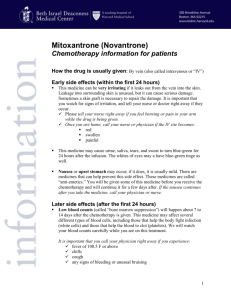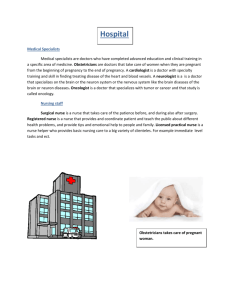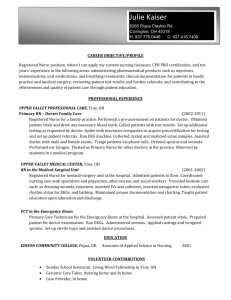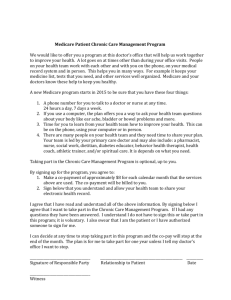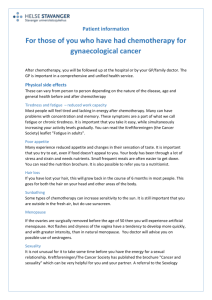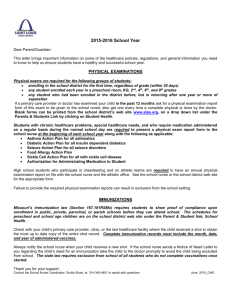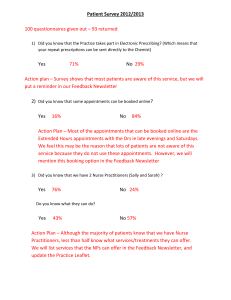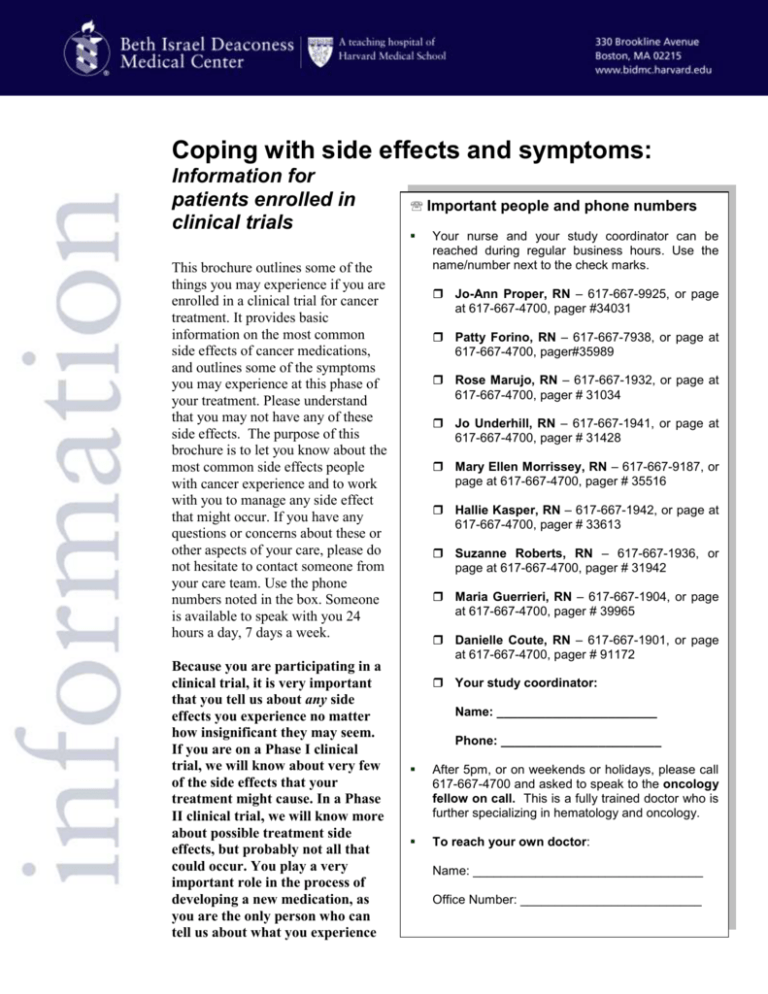
Coping with side effects and symptoms:
Information for
patients enrolled in
clinical trials
Important
This brochure outlines some of the
things you may experience if you are
enrolled in a clinical trial for cancer
treatment. It provides basic
information on the most common
side effects of cancer medications,
and outlines some of the symptoms
you may experience at this phase of
your treatment. Please understand
that you may not have any of these
side effects. The purpose of this
brochure is to let you know about the
most common side effects people
with cancer experience and to work
with you to manage any side effect
that might occur. If you have any
questions or concerns about these or
other aspects of your care, please do
not hesitate to contact someone from
your care team. Use the phone
numbers noted in the box. Someone
is available to speak with you 24
hours a day, 7 days a week.
Because you are participating in a
clinical trial, it is very important
that you tell us about any side
effects you experience no matter
how insignificant they may seem.
If you are on a Phase I clinical
trial, we will know about very few
of the side effects that your
treatment might cause. In a Phase
II clinical trial, we will know more
about possible treatment side
effects, but probably not all that
could occur. You play a very
important role in the process of
developing a new medication, as
you are the only person who can
tell us about what you experience
people and phone numbers
Your nurse and your study coordinator can be
reached during regular business hours. Use the
name/number next to the check marks.
Jo-Ann Proper, RN – 617-667-9925, or page
at 617-667-4700, pager #34031
Patty Forino, RN – 617-667-7938, or page at
617-667-4700, pager#35989
Rose Marujo, RN – 617-667-1932, or page at
617-667-4700, pager # 31034
Jo Underhill, RN – 617-667-1941, or page at
617-667-4700, pager # 31428
Mary Ellen Morrissey, RN – 617-667-9187, or
page at 617-667-4700, pager # 35516
Hallie Kasper, RN – 617-667-1942, or page at
617-667-4700, pager # 33613
Suzanne Roberts, RN – 617-667-1936, or
page at 617-667-4700, pager # 31942
Maria Guerrieri, RN – 617-667-1904, or page
at 617-667-4700, pager # 39965
Danielle Coute, RN – 617-667-1901, or page
at 617-667-4700, pager # 91172
Your study coordinator:
Name: _______________________
Phone: _______________________
After 5pm, or on weekends or holidays, please call
617-667-4700 and asked to speak to the oncology
fellow on call. This is a fully trained doctor who is
further specializing in hematology and oncology.
To reach your own doctor:
Name: _________________________________
Office Number: __________________________
both during and after receiving the study medicine. By the time a medicine reaches a Phase
III clinical trial, we usually know about all the possible side effects that can occur.
Please do not hesitate to call us at any time to report on a symptom or problem you are
having.
Many clinical trials will specify certain days or times that blood work or tests need to be done,
according to the particular protocol. You will be informed of these by your research nurse,
physician, or study coordinator.
What causes side effects?
Because cancer cells may grow and divide more rapidly than normal cells, many anticancer drugs
are designed to kill growing cells. But certain normal, healthy cells also multiply quickly, and
chemotherapy can affect these cells, too. This damage to normal cells causes side effects. The
fast-growing, normal cells most likely to be affected are blood cells forming in the bone marrow,
cells in the digestive tract (mouth, stomach, intestines, esophagus), reproductive system (sexual
organs), and hair follicles. Some anticancer drugs may affect cells of vital organs, such as the
heart, kidney, bladder, lungs, and nervous system.
You may have none of these side effects or just a few. The side effects you have and how severe
they are depend on a number of things, such as the type chemotherapy you get, the dose, and how
your body reacts to it. Before starting chemotherapy, your doctor and nurse will discuss the side
effects that you are most likely to get with the drug you will be receiving.
Fatigue
Cancer-related fatigue is the most common side effect experienced by cancer patients. It may be
due to the disease itself, treatments given (chemotherapy, radiation therapy, surgery), medication
used to treat or prevent side effects, low blood counts, pain, depression, lack of sleep, stress, poor
appetite, or other factors. Cancer-related fatigue may appear either gradually or very suddenly. It
can be mild, very severe, or somewhere in between. Every person is different.
Cancer-related fatigue is very different from the fatigue you experience after working hard or
being up all night. This fatigue does not get better if you get more sleep. We recommend that
you take short power naps during the day, exercise as much as you are able, conserve energy
whenever possible, drink lots of fluids without caffeine, and eat a well-balanced diet. We will
give you additional information on how to manage this common side effect.
Cancer-related fatigue could last long after your treatments are completed and your disease is in
remission. Again, everyone is different and we will try to help alleviate the fatigue you
experience.
Nausea and vomiting
Many patients fear that they will have nausea and vomiting while receiving chemotherapy. But
powerful new “anti-emetic” or “anti-nausea” drugs have made these side effects far less common.
When nausea and vomiting do occur, the anti-emetics can help ease these symptoms in most
patients. Different anti-emetics work for different people, and you may need more than one
medication to get relief. Do not give up. Continue to work with your doctor and nurse to find the
medicines that work best for you. Be sure to call your physician or nurse if you experience nausea
or vomiting.
Low blood counts
Low blood counts (called “bone marrow suppression”) may happen about 7 to 14 days after the
chemotherapy is given. The chemotherapy medicine may affect different types of blood cells,
including those that help the body fight infection (white cells) and those that help the blood to clot
(platelets). When your counts are low, you may be prone to infection. It is important for you and
for others that you are in close contact with to wash hands frequently to help prevent infection
during this phase of your care. Please avoid close contact with anyone who has a cold or flu.
We will monitor your blood counts carefully in between your treatments. If your counts fall very
low, we can give antibiotics to fight infection, or special transfusions of blood products. This may
require staying in the hospital for treatment until your blood counts are better.
It is important for you to call your physician right away if you experience:
Fever of 100.5 F or above
Chills
Cough
Any signs of bleeding or unusual bruising:
Blood in the urine or bowel movement
A bowel movement that looks black
Blood in the vomit, or vomit that looks like “coffee grounds”
Unusual bruising
Mouth sores
Mouth sores (mucositis) may develop. Your
mouth may feel dry or burn, and you may see
redness when you look in the mirror. Your
mouth may feel sore and painful. Call your
physician or nurse if you develop a mouth sore
or pain/tenderness in your mouth.
To speed up healing and help with pain, use
homemade mouth rinse 4-5 times daily. (See
box.) For small sores, dab the area with
children’s “teething paste,” which you can buy
at the drug store.
If the pain continues and you cannot eat, or if
you develop more mouth sores, call your
physician or nurse to let them know.
Mouth Care
You are prone to mouth sores
because of your treatment.
Please use a soft bristle toothbrush.
If you get mouth sores, dissolve one
teaspoon salt OR one teaspoon
baking soda in warm water. Use this
4-5 times a day to rinse or gargle.
Do not use store-bought mouthwash.
Diarrhea
When chemotherapy affects the cells lining the intestine, it can cause diarrhea (watery or loose
stools). If you have diarrhea that continues for more than 24 hours, or if you have pain and
cramping along with the diarrhea, call your doctor or nurse. If diarrhea persists, you may need
intravenous (IV) fluids. These can usually be given without admitting you to the hospital. Do not
take any over-the-counter medicine for diarrhea without asking your doctor or nurse.
Neuropathy (nerve damage)
Damage to nerves sometimes occurs. This may include damage to the nerves that control hearing.
This often improves when the chemotherapy is finished, but sometimes the damage is permanent.
Please tell your nurse or doctor if you notice any of the following signs of nerve damage:
Numbness
Tingling
Burning
Weakness
Constipation
Some anti-cancer medicines, pain medicines, and other medicines can cause constipation.
Constipation can also occur if you are less active or if your diet lacks enough fluid or fiber. If you
have not had a bowel movement for more than a day or two, call your doctor, who may suggest
taking laxatives or stool softener.
Allergic reaction
In rare cases, an allergic reaction may occur. The reactions are usually mild and can be treated
with medicine, but they sometimes can be serious. It is important to tell your doctor or nurse
right away if you have any of the following symptoms of an allergic reaction:
Rash
Breathing problems
Chest discomfort
Back pain
Itching (especially in the palms of the hands)
Tickle in your throat
Eye irritation
Call your doctor if…
Remember; please call your doctor or nurse if you notice any of the following. You may call any
time.
Nausea or vomiting not relieved by medicine.
Redness, swelling, or pain at or near the site of your IV
Fever of 100.5 or above, chills, or cough
Any signs of bleeding
Signs of nerve damage, such as numbness, tingling, burning, or weakness
Inability to move your bowels
Any signs of allergic reactions (such as rash, breathing problems, chest discomfort,
back pain, itching, tickle in your throat, or eye irritation)
Diarrhea
Any other symptoms that concern you
Please Remember
Other side effects not listed here may occur. If other side effects are known we will include
information on them. Please tell your nurse or physician if you experience anything unusual.
This material was developed by research nurses in the cancer clinical trials office at Beth Israel Deaconess Medical Center. It is produced
and distributed by the Beth Israel Deaconess Learning Center. ©2004, Beth Israel Deaconess Medical Center. All rights reserved.
MC0956 3/04

